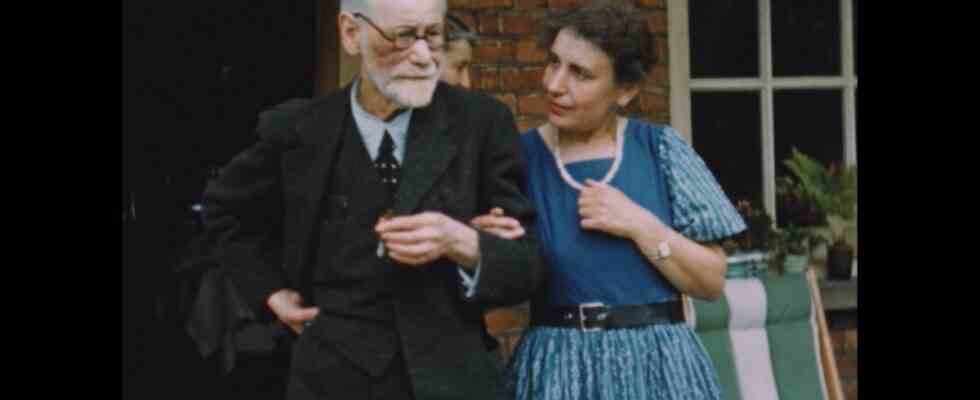There is a nice anecdote from Billy Wilder about his attempt to interview Sigmund Freud as a young journalist in Vienna. That was around 1925 or 1926, Wilder later recalled in an interview. He went to Berggasse 19, where the famous doctor first made him wait in the salon. Then Freud came in morosely from lunch, still tied with his napkin, and annoyed asked if he was a reporter. When Wilder said yes, Freud, who didn’t like journalists, immediately kicked him out with the words: “There’s the door!”
When leaving the apartment, Wilder was still able to take a look at the legendary couch in the treatment room, which seemed exceptionally small to him. The joke, which he couldn’t miss afterwards as revenge for being thrown out: “Freud’s entire theories were based on the analysis of very small people.”
Freud was a gifted storyteller, but he still preferred to throw journalists out
It’s a shame that the interview didn’t take place. Because a conversation between Billy Wilder and Sigmund Freud would of course have become required reading worldwide. But Freud hated questioning, even though as a narrator (at least in writing) he was a gifted entertainer. You don’t have to agree with him in everything, but his books, especially the cultural-theoretical writings such as “The Uncanny” or “The Discomfort in Culture” are still entertaining and enriching reading.
Because there are not too many interviews with Freud, but he himself is the best narrator of his biography, the French director David Teboul only used original sources for his documentary “Sigmund Freud”. He didn’t want to make a film about Freud, but with it. To do this, he draws on his writings, but above all on his numerous correspondences with family, friends, colleagues and disciples. These texts, which are read by the Austrian actor Johannes Silberschneider, are supplemented by, among other things, letters from Freud’s daughter Anna, which are read by the Austrian actress Birgit Minichmayr.
Anna was a faithful student and chronicler of her father. In her letters she recalls major breakthroughs in psychoanalytic work and decisive biographical experiences. But she also remembers many beautiful little things that make a person come alive. Like the smell of cigars, for example, that wafted out of his father’s study late at night when he finally called it a day at the end of a long day.
“My father always said that biographers were liars…”: Anna and Sigmund Freud in 1929.
(Photo: Film-Kino-Text/Freud Museum London)
Anna, who later carried on Freud’s legacy as a psychoanalyst herself, also has the following sentence: “My father always said that biographers were liars…” In order to do Freud justice in his own way, director David Teboul approaches his protagonist therefore as the psychoanalyst approaches his patient’s problem: via the path of free association.
Freud’s letters and other primary sources are illustrated with pictures from turn-of-the-century Vienna, rare archive photographs without romanticism, and even rarer photographs from the Freud family life, some of which have not yet been shown. At times it seems more experimental than documentary, with footage of late 19th-century mountaineers, like psychoanalysts, scrambling in the great unknown of mountain ranges in search of discovery. But that also goes well with the topic.
The film does not provide any surprising insights or revelations about Freud’s life and work. But since Freud, to put it mildly, one of the better researched figures of his time, that doesn’t have to be the expectation at all. If you want to know every last detail, you still can’t avoid the legendary, almost 1000-page Freud biography by the German-born US historian Peter Gay. Because of its experimental approach, the film is nevertheless exciting to watch for both newcomers and Freudians.
Director Teboul has already made various biopics, for example about Brigitte Bardot and Yves Saint-Laurent. He has a good feeling for classifying his protagonists in their epochs. To show how the world into which one is thrown as a small human being, without being able to influence time and place, becomes the point of friction for every work.
Although Freud had already completed the “Interpretation of Dreams” earlier, he did not publish it until 1900 because he was aware that with this work he would usher in a new epoch, which should also be reflected in the publication date. Of course, what he could not foresee was the cultural break of the First World War and the rise of National Socialism in the decades that followed. The film pointedly shows how his life and work changed over the course of history. The shift from the primacy of sexuality in his teachings to the powerful force of the death drive in human agency. He himself described this change of heart as a “marriage of convenience” with his “dark theories”. The film also touches on Freud’s relationship to religion, especially Judaism.
Most impressive, however, are the recordings of the late Freud in the late 1930s, driven into exile in London by the Nazis. He is already terminally ill in these film recordings. The palate cancer had already spread unstoppably and caused a putrid smell that put his beloved dog Yofie away from him. The flight from Austria was a burden that Freud could hardly bear physically. But the will to die self-determined and free from self-pity not in a dictatorship but in freedom was stronger.
Sigmund Freud, un juif sans Dieu, France/Austria 2020 – Director: David Teboul. Book: Teboul, François Prodromidès. Camera: Martin Roux, Richard Copans. Editor: Caroline Detournay. Speakers: Birgit Minichmayr, Johannes Silberschneider, Catherine Deneuve. Film cinema text, 97 minutes. Theatrical release: May 5, 2022.

